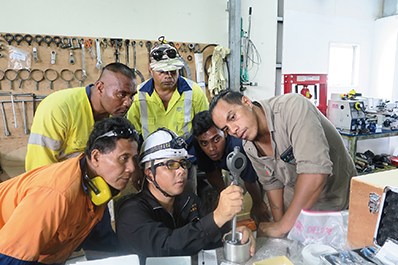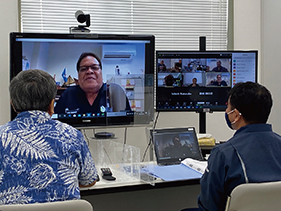Stories from the Field 4
Realizing Hybrid Power Generation in the Pacific Island Countries Using Experience and Technology of Okinawa
—Stable, clean, and low-cost power generation technology for the island countries with power vulnerability—

Providing guidance to Kiribati engineers on measuring engine parts (Photo: Okinawa Enetech)

Online training with engineers from each countries (Photo: Okinawa Enetech)
Diesel-power generation is mainstream in most Pacific Island countries. As these countries rely on imports for almost 100% of their fuel, they are vulnerable to the impacts of transportation costs and price rises, which is an energy security issue. There is also a need to shift to renewable energy sources such as solar and wind as a countermeasure against global warming.
In response to this situation, the “Project for Introduction of Hybrid Power Generation System*1 in the Pacific Island Countries” was launched in 2017, with its base in Fiji. It targets public power companies in the five countries of Fiji, Federated States of Micronesia, Marshall, Kiribati, and Tuvalu.
“Although diesel power generation enables a stable power supply, fuel costs and power generation facility maintenance costs are high, creating a considerable burden for power companies. On the other hand, renewable energy such as solar power is low-cost and clean, however it does not provide a stable power supply without appropriate planning because power output fluctuates according to weather conditions. A hybrid power generation system combines the respective advantages of these two power generation systems, namely stable and low-cost power supply. The governments of the target countries are highly conscious of the issues of global warming and energy security, and I feel their high expectations for this project,” said JICA Senior Advisor Mr. OGAWA Tadayuki, who works as Chief Advisor of the project.
In order to promote the introduction of hybrid power generation systems and to ensure that the equipment can be properly maintained and managed by the engineers of power companies in each country after the project is completed, the project has focused on instructing key engineers from each country who are appointed as “core trainers.” Furthermore, experts from Okinawa are passing on the expertise and technology that they have acquired from their experiences in the islands of Japan, in order to turn the training center of Energy Fiji Limited (EFL) into a center for South-South cooperation.
Due to the impact of the COVID-19 pandemic, the project utilizes video conferencing systems to provide training on improving the operational efficiency of diesel power generation, and on introducing, operating, and maintaining hybrid power generation systems. “I think that even though the training has been conducted remotely, we have definitely improved the training impact by exercising our ingenuity, such as enhancing the study materials and conducting examinations to check trainees’ level of understanding. Another advantage is that when trainees have any questions on-site, we can contact them online and provide advice directly,” said Mr. KAKEFUKU Luis of Okinawa Enetech Co., Inc., who is playing a central role in technical consultation. This detailed consultation has produced concrete results in the various countries, including more efficient solar power generation and improved fuel consumption rates in diesel power generators.
In the training process, efforts were made to transform the mindsets of each country’s power company officials related to power generation, including safety management, and organization. “As a result of continuous consultation, the inside of power generation facilities are more organized and engineers who took part in the training have become more safety-conscious. I heard about engineers buying safety shoes, suggesting that they were taking a proactive approach,” said Mr. Kakefuku.
There have been high levels of interest in this project across the Pacific region. Some engineers from EFL became instructors in March 2021 and have carried out local training for seven countries*2 that were not originally covered by the project. The knowhow based on experiences in Okinawa has been accumulated in Fiji, and with EFL as a center, initiatives to introduce hybrid power generation systems are continuing to spread across the Pacific region.
*1 A form of power generation that combines two or more systems from among diesel power generation and various renewable energy sources (solar, wind, etc.).
*2 Cook, Nauru, Palau, Papua New Guinea, Samoa, Solomon Islands, and Tonga.
<< Previous Page Next Page >>
Main Text | Reference Statistics | Stories from the Field | Master Techniques from Japan to the World | ODA Topics
